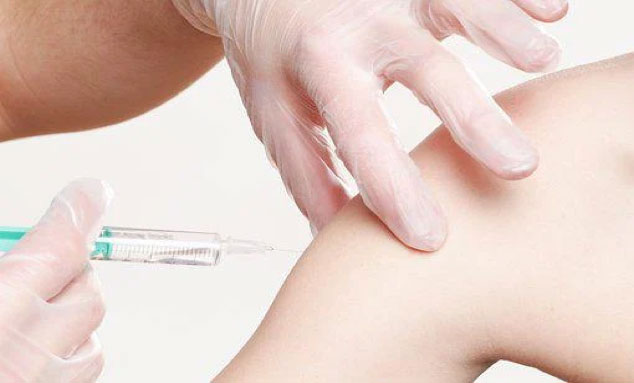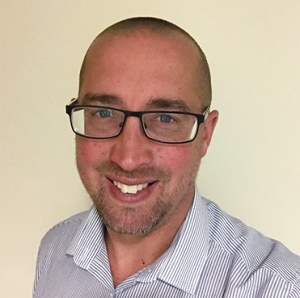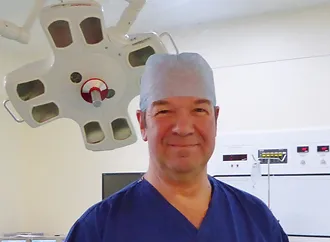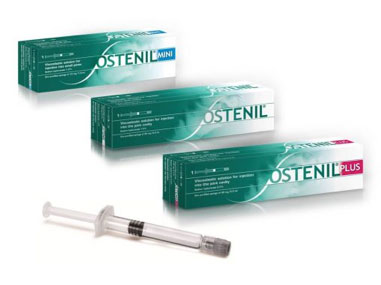Experienced advanced physiotherapy practitioners Neil Liffen and Hayley Jarvill, offer specialised joint injections alongside Orthopaedic Consultant Paul Nicolai.
Paul specifically offers Arthrosamid; a cutting-edge injectable hydrogel that delivers long-lasting, proven pain relief for knee OA (Osteoarthritis), improving your quality of life without surgery.


Neil, is an Extended Scope Practitioner in Physiotherapy and a Diagnostic Musculoskeletal Sonographer with over 15 years experience working within the NHS and private practice.
Historically, Neil Liffen career began at Norwich City FC as a footballer and played at a professional level at a reserve team level, ironically, having been an avid Ipswich Town FC supporter. A coaching career the pursued at Ipswich Town FC, whilst working with the academy and professional players and studying BSc (Hons) Sport Science Degree, before the commencement of a BSc (Hons) Chartered Physiotherapist career. The quest of ensuring correct diagnosis and management, detailing a ‘point of care’ approach led Neil to MSc (distinction) Diagnostic Musculoskeletal Ultrasound. Nationally, there is only a small number of physiotherapists qualified with this specialism to perform diagnostic musculoskeletal ultrasound and Neil has been invited to teach at Bournemouth University to consultants, GP’s, sports physicians and other health care professionals.
Neil currently divides his commitments between, working as an Extended Scope Practitioner in Physiotherapy at ECP (East Coast Physiotherapy) specialising in diagnosis and treatment management for acute and chronic pain and working in Radiology departments specialising in musculoskeletal diagnostic ultrasound imaging and guided injections. In addition, he regularly attends various GP practices to offer injection therapy on behalf of their Hope patients.

Hayley is a specialist neuromusculoskeletal physiotherapist with experience of working in both the NHS and private sector since 2006. She worked in the NHS for many years before specialising as an Extended Scope Practitioner and performed this role for over a decade where she diagnosed complex musculoskeletal conditions, diagnostics and delivered specialised peripheral joint injections before becoming a Partner at Bury Physio.
Hayley gained a BSc (Hons) degree in Physiology from the University of Leicester before completing an MSc in Rehabilitation at the University of Brighton. In 2015 she completed her second masters, in Advancing Neuromusculoskeletal Practice, at the University of Hertfordshire and gained MACP accreditation. This is a specialist register of the top 1000 physiotherapists in the UK who have undertaken extensive postgraduate study to reach a recognised standard of clinical excellence in neuromusculoskeletal physiotherapy assessments, treatments and management.
Hayley qualified in injection therapy from the University of Coventry in 2014 and offers Steroid and Ostenil injections privately here at Bury Physio.

Paul Nicolai FRCS (Tr & Orth) has been working as a consultant in Bury St Edmunds (Suffolk, UK) since September 2003. Click to find out more about Paul, or visit the Circle Health Website for private consultation appointment information.
What can injection therapy be used for?
Generally, we inject most peripheral joints and associated soft tissue injuries.
Injection therapy is an extremely effective treatment helping to complement a physiotherapy programme and can be used for the following conditions:
Shoulder
- Shoulder Impingement (subacromial space/bursa)
- Shoulder (Subacromial) Bursitis
- Shoulder osteoarthritis
- Adhesive Capsulitis/Frozen shoulder
- AC joint sprain and/or osteoarthritis
- Long head of biceps tendon
Elbow
- Elbow osteoarthritis
- Tennis elbow (lateral epicondylitis pain)
- Golfer’s elbow (medial epicondylitis)
- Olecranon bursitis
Wrist & Hand
- Wrist osteoarthritis
- Carpal Tunnel Syndrome
- Hand and Finger Joints
- Trigger thumb/finger
- De Quervain’s Tenosynovitis
Knee
- Knee osteoarthritis
- Knee bursitis
- Bakers cyst
- ITB syndrome
Ankle and Foot
- Ankle, subtalar joint and small joints of mid foot osteoarthritis
- MTP and toe joints (big toe joint)
- Morton’s neuroma/inter digital bursitis
- Achilles tendon (likely includes no steroid)
Please note, we do not inject the spine or sacroiliac joint.
Injection therapy produces an anti-inflammatory and pain relieving treatment directly to the joint or soft tissues causing pain. Injection Therapy can reduce the need to take anti-inflammatory medications. Non-Steroidal Anti-inflammatory Drugs (NSAID’s) can cause stomach upsets and bleeding with prolonged use and often some patients are unable to take any NSAID’s at all. Injections bypass the stomach making them a preferred choice for pain relief. Your Physiotherapist will fully access your eligibility for an injection and discuss the aftercare and frequency of future treatments with you for the best outcome.
Ultrasound guided injections
Neil Liffen also provides a highly specialised ultrasound guided service which uses high frequency sound waves via a probe to guide the injection and can be used diagnostically prior to injections to aid assessment of the painful area.
Injection product information
What are steroid injections?
Some steroids occur naturally in our bodies, and artificial steroids can be used and injected into joints to help reduce inflammation, and therefore pain. It’s not curative, but can help reduce symptoms to help improve quality of life. A local anaesthetic is also used prior to delivery of the steroid injection to help with pain symptoms.
It can take about a week to notice any reduction in symptoms and can last anything from several weeks to several months. They can also be used in conjunction with Physiotherapy for increased effectiveness and longer term gains.
There are certain medical conditions whereby steroid injections can’t be used and therefore a full assessment is conducted for safety and screening prior to injection.
We do not offer spinal injection, but all other joint injections.
What is Ostenil Injections? (Ostenil Plus)
Bury Physio is delighted to be able to offer this fantastic treatment option for sufferers of Osteoarthritis and many other soft tissue conditions.
Osteoarthritis is the most common type of arthritis and is due to damage to synovial joints. Ostenil is a solution containing hyaluronic acid developed specifically for the treatment of osteoarthritis. It can be injected into the knee, hip or shoulder or any of the other synovial joints in the body. It acts as an immediate lubricant and shock absorber to immediately decrease pain and stiffness in the joint, and stimulates the cells that produce synovial joint fluid in the joints and helps restore the normal balance of breakdown and production to give long lasting pain relief. Ostenil plus contains a higher concentration of sodium hyaluronate (hyaluronic acid) meaning only one injection is required per treatment cycle.

Strong clinical evidence exists to prove the effectiveness of Ostenil and it is very pure, with no animal proteins meaning it’s unlikely to cause an allergic reaction. When the effects of Ostenil wear off after several months (9-12 months) or longer, further injections can be administered if your injection therapist deems it’s appropriate. Ostenil has not been known to cause any serious side effects either.
Platelet Rich Plasma (PRP) injections
Endoret® (PRGF®) technology has the most experience on the market in terms of the development of specific protocols for tissue regeneration, a ground-breaking technique exclusively developed by BTI Biotechnology Institute.
Therapeutic application of Endoret® (PRGF®) in orthopaedic surgery and sports medicine has been revealed as one of the most effective treatments for arthrosis, tendon, ligament and muscular injuries, as well as in the recuperation of fractures or surgical interventions.
Endoret® (prgf®) technology is the most advanced autologous PRP system. It is based on the activation of your own platelets for the stimulation and acceleration of tissue healing and regeneration. It is scientifically effective and safe, with over one hundred scientific articles published in specialised journals and its presentation at hundreds of congresses.
Endoret is used for;
- Mild to moderate osteoarthritis of all joints
- Tendinitis/tendinopathy/tendinosis at all joints
- Tendon, ligament or muscle tears at all joints
- Plantar fasciitis
Procedure of Endoret
The procedure is performed in our out-patient clinic and can take up to an hour to complete. A sample of blood is taken from your elbow region and is spun in a centrifuge. The growth factors are extracted and injected into the treatment site using ultrasound guidance.
Protocol
Endoret can be used as a single injection but best results include three consecutive injections, at weekly or fortnightly intervals.
Is Endoret safe?
Since the treatment is prepared from your own blood, the treatment carries a low risk. Routinely there are no side effects to Endoret.
For further information see Traumatology | BTI Biotechnology Institute (bti-biotechnologyinstitute.com)
What is the procedure of PRP?
Blood sample is drawn from a vein in your arm. Your sample is spun in a centrifuge machine which separates the blood. The high concentration of PRP is injected into your treatment site using ultrasound guidance.
The procedure is performed in our out-patient clinic and can take up to an hour to complete. The 3 main steps of the procedure are outlined below:
The science behind PRP therapy
PRP supports your body’s self-healing processes by using your own cells. Blood is mostly liquid (called plasma) but also contains solid components including red cells, white cells and platelets. The platelets are important for clotting blood but they also contain proteins called growth factors which are important in the healing of injuries.
With a higher concentration of growth factors than typically found in blood, PRP injections support the restoration of injured tissue and inhibit painful inflammatory processes.
This treatment is widely researched and supported in clinical papers. See our PRP evidence section.
What are the benefits of PRP?
The benefits of PRP can include
- Reconstruction of the injured tissue
- Prevention of painful inflammatory processes
- Improvement in mobility
- Delay in progression of the disease and the need for an artificial joint
- Reduction of analgesics with possible side effects.
PRP recovery
Patients may experience some localised pain and swelling from their injection, which will subside over 24-48 hours. There are no lasting side effects of the treatment, but we suggest bringing someone with you on the day of your treatment.
It is recommended that you minimise your activity level for 14 days (but not to exceed pre-injection levels).
Pain is reduced after just one week and clinical studies have demonstrated the effectiveness of one injection.
The effect of the treatment may take 3-4 weeks to become evident following the injection, with a sustained improvement over the coming weeks and months. Studies suggest one injection can last at least 12 months and will delay the need for surgical joint replacements over time.
How long do the benefits last?
A course of three injections, in weekly or fortnightly intervals, have been found to provide significant benefits for an average of 12 months in knee osteoarthritis and in tendinopathy.
Is PRP right for me?
PRP treatment should be considered for patients who are not finding effective symptom control for their musculoskeletal (MSK) related condition from other conservative treatments, and where surgery may not be considered an appropriate option.
Prices
Ostenil (1 injection site) = £290
Ostenil (2 injection sites)= £500
Steroid (ultrasound guided) 1 Site = £250
Steroid (ultrasound guided) 2 Sites = £375
Steroid (palpated)= £180
Ultrasound assessment (Scan and Report) = £150
Ostenil and steroid injection together (1 site)= £325
Ostenil and steroid injection together (2 site) = £550
Frozen shoulder hydrodistension/ hydrodilatation= £270
Please Note: Neil will only be able to advise on the specific injection you require at your assessment, therefore admin are unable to quote exactly for your appointment charge.
Please use the chart above as a guide. We can contact Neil on your behalf if you require further clarification of the likely injection type if needed.
To book an appointment, please email admin@buryphysio.co.uk or call the clinic on 01284 748200.
FOR ALL APPOINTMENTS PLEASE BOOK HERE

HOME | ABOUT | NEWS & EVENTS | CONTACT US | BOOK ONLINE
Maynewater Lane, Bury St Edmunds, Suffolk, IP33 2AB | 01284 748200 | admin@buryphysio.co.uk